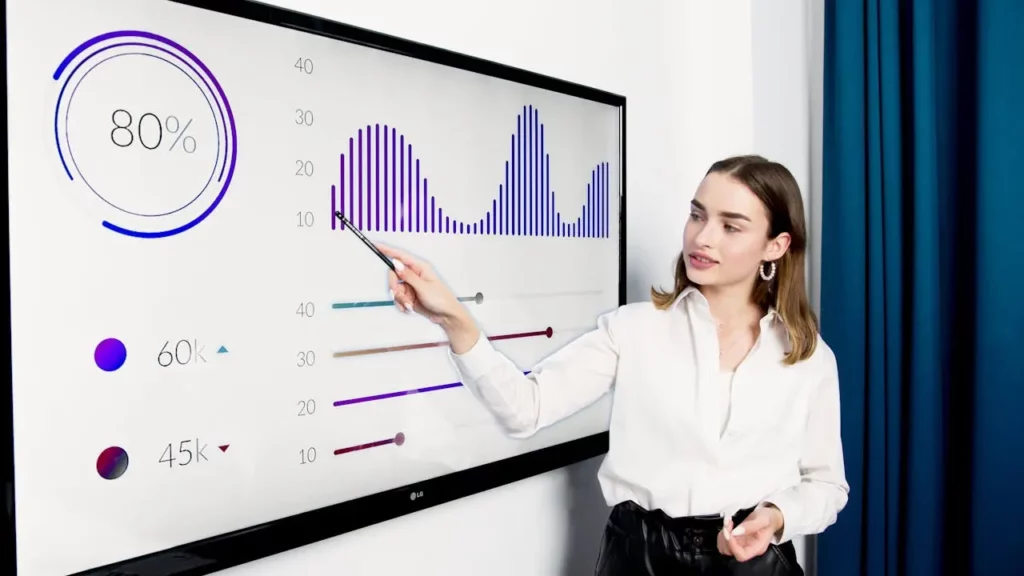Branding for Realtors is more than just a logo or tagline. Your brand is the face and the personality of your real estate business. But how do you know if your branding is actually working?
Is your real estate branding attracting the right clients, building trust, and setting you apart in a competitive market? Measuring the effectiveness of your branding strategy is essential to ensure your hard work pays off. Here are three ways for Realtors to evaluate whether your branding is making an impact.
One of the clearest indicators of successful branding is client feedback. Your brand should reflect the values, expertise, and professionalism you bring to the table—and your clients will let you know if it’s working.
Ways to Collect Feedback:
Pro Tip: If feedback highlights confusion or inconsistency, it might be time to refine your messaging or visuals.

Your branding should attract the type of clients you want to work with. If your leads don’t align with your target audience, your branding might not be communicating the right message.
Questions to Ask Yourself:
Pro Tip: Analyze your website analytics and social media insights to see if your audience matches your ideal client profile. This data can reveal whether your branding is aligned with your goals.

At the end of the day, your branding should contribute to tangible growth in your business. This includes more referrals, repeat clients, and an expanding presence in your local market.
Metrics to Track:
Pro Tip: Strong branding doesn’t just lead to more clients—it also fosters loyalty and long-term relationships.

Your branding should work as hard as you do to attract clients, build trust, and grow your real estate business. By tracking client feedback, lead quality, and business growth, you can determine whether your strategy is effective—or if it’s time for a refresh. Remember, strong branding isn’t just about aesthetics; it’s about creating a memorable experience that resonates with your ideal audience.
Targeted ads can be a game-changer for realtors, but not everyone knows how to use them effectively. Whether you’re advertising on Google, Facebook, or Instagram, these platforms offer powerful tools to connect with your ideal clients. The problem? Many realtors end up wasting money on campaigns that don’t work. This guide breaks down what every realtor should know about targeted ads—and how to use them to drive leads and grow your business.
In today’s competitive market, standing out from the crowd is essential, and targeted ads allow you to do just that. By focusing your budget on specific audiences, you’re more likely to attract leads who are actively looking to buy or sell a home.
Benefits of Targeted Ads:
Pro Tip: Realtors who use targeted ads effectively often see a significant return on investment by focusing on high-intent buyers and sellers.

Running targeted ads might sound straightforward, but many realtors make avoidable mistakes that hurt their results.
Top Mistakes to Avoid:
Pro Tip: Start small with your budget and analyze results before scaling up. A focused, well-optimized campaign is more effective than casting a wide net.

To get the most out of your paid advertising, it’s essential to have a strategy that aligns with your goals.
Key Best Practices:
Pro Tip: Combine targeted ads with strong landing pages. Ensure your website is optimized to capture leads once they click on your ad.

Targeted ads are one of the most effective ways to grow your real estate business—if you know how to use them correctly. By avoiding common mistakes and following best practices, you can attract the right leads, save money, and increase your chances of closing deals. Take the time to refine your ad strategy in 2025 and watch your business thrive.
Curious about new real estate tools and apps for agents in 2025? In today’s fast-paced tech and real estate economy, staying organized and efficient is critical for success. With so many moving parts in your business and transactions, from client follow-ups to property marketing, Realtors need the right tools to save time and stay competitive. In 2025, the most successful real estate agents are embracing game-changing tech solutions to streamline their workflows. Here are the must-have tools every real estate professional needs this year.
Like an old-school Rolodex, using Customer Relationship Management (CRM) tools is a non-negotiable for Realtors. But more than a Rolodex, a good CRM not only helps you organize client information but also automates follow-ups, schedules reminders, and tracks deal progress.
Top CRM Picks for Realtors in 2025:
Pro Tip: Use your CRM to segment your audience (buyers, sellers, investors) so you can tailor your communication to their specific needs.

Marketing automation tools save time and ensure consistency across all your channels. From creating professional-looking listing presentations to scheduling posts on social media, these platforms handle it all.
Essential Marketing Tools:
Pro Tip: Use templates in Canva to create branded materials that make you stand out while saving hours of design time.

Keeping track of contracts, deadlines, and paperwork can be overwhelming, even for the most fastidious real estate agents. Transaction management platforms centralize everything, ensuring smooth closings while reducing errors.
Top Transaction Management Tools:
Pro Tip: Integrate your transaction management software with your CRM for a seamless experience from lead capture to closing day.

The right tools can revolutionize your real estate business, saving you time and improving client satisfaction. By investing in CRM software, marketing automation platforms, and transaction management tools, you’ll simplify operations and stay ahead of the competition. Take the time to evaluate your current processes and adopt the solutions that will help you work smarter in 2025.
Social media is one of the most powerful marketing tools for Realtors, but simply posting listings isn’t nearly enough. If you want to grow your audience, attract leads, and build your real estate brand using social media, your content needs to stop people mid-scroll. The best real estate social media post ideas include engaging visuals, compelling storytelling, and strategic posting. Here’s how to create scroll-stopping social media content that actually works for your real estate business.
Video is the most engaging type of content on social media, and platforms like Instagram, TikTok, and Facebook reward it with more visibility. Whether it’s short-form Reels, property walkthroughs, or behind-the-scenes content, video keeps your audience engaged longer.
How to Use Video Effectively:
✔ Reels & TikToks: Showcase quick home tours, market updates, or day-in-the-life clips.
✔ Live Videos: Host Q&A sessions, virtual open houses, or client success stories.
✔ Story Highlights: Save past videos so new followers can easily access valuable content.
Pro Tip: Keep videos under 60 seconds for better engagement, and always add captions for viewers watching without sound.

People love to engage with content that feels personal, informative, or entertaining. Instead of just sharing listings, use storytelling and interactive elements to spark conversation and build relationships.
Engaging Post Ideas for Realtors on Social Media:
✔ Before-and-after transformations of staged homes.
✔ Client success stories with testimonials.
✔ Polls & Q&A boxes on Instagram Stories about real estate trends.
✔ Behind-the-scenes content showcasing your daily life as a realtor.
Pro Tip: Posts that tell a relatable story get shared more often, helping your content reach a wider audience.

When you post your real estate social media content, the caption is just as important as your visuals. A strong caption should grab attention, offer value, and include a clear call to action (CTA), such as “DM me for details” or “Comment your dream home features.”
Winning Caption Formula:
✔ Hook: Start with an intriguing question or statement.
✔ Value: Share helpful insights, market updates, or home tips.
✔ CTA: Encourage followers to engage by liking, commenting, or sharing.
Hashtag Strategy:
Use a mix of broad and niche hashtags to increase visibility. Examples:
🏡 #DreamHomeGoals
📍 #YourCityRealtor
💰 #FirstTimeHomebuyer
Pro Tip: Keep hashtags relevant to your location and target audience to attract serious buyers and sellers.

For real estate agents, social media isn’t just about posting listings but engagement, storytelling, and visibility. By using the power of video, creating interactive posts, and optimizing captions, you can capture more attention and build stronger connections with your audience. The key is consistency—post regularly, engage with your followers, and track what content performs best to refine your strategy.
Wondering which real estate KPI metrics a Realtor should track to improve your process and win more business? The real estate industry is fast-paced, and success often comes down to tracking the right data. Yet with so many tools and reports available, it’s easy to get overwhelmed by numbers that don’t actually move the needle. Instead of wasting time on vanity metrics, focus on these three key performance indicators (KPIs) to better understand your marketing and sales impact—and drive real results for your real estate business.
Generating leads is just the first step—what really matters is how many of those leads turn into actual clients. Your lead conversion rate measures the percentage of leads that result in a signed contract or transaction.
Why it matters:
A high lead conversion rate means your marketing efforts and follow-up processes are working efficiently, while a low rate may signal the need to refine your outreach, lead nurturing, or targeting strategy.
How to calculate it:
LeadsConverted÷TotalLeadsGenerated×100=ConversionRateLeads Converted ÷ Total Leads Generated × 100 = Conversion RateLeadsConverted÷TotalLeadsGenerated×100=ConversionRate
Pro Tip: Use a CRM system to track the source of your leads and see which channels (social media, paid ads, referrals, etc.) deliver the highest ROI.

Your average days on market (DOM) is a critical indicator of how well you’re pricing and marketing your listings. DOM measures the number of days it takes for a property to go from being listed to under contract.
Why it matters:
A shorter DOM suggests effective pricing, staging, and marketing strategies, while a longer DOM could mean adjustments are needed. Tracking this metric over time also helps you identify trends in the market and set client expectations.
How to improve DOM:
✔ Optimize your listing photos and descriptions for maximum appeal.
✔ Use targeted marketing to reach the right buyers faster.
✔ Regularly update clients about feedback from showings and adjust strategies as needed.
Pro Tip: Compare your DOM to the average for your market to see how your performance stacks up.

Your client retention rate measures how many clients return for repeat transactions or refer others to you. For realtors, relationships are everything, and retaining happy clients can be much more profitable than constantly chasing new leads.
Why it matters:
A high retention rate signals strong client satisfaction, trust, and loyalty. It’s a sign that you’re building long-term relationships that fuel your business through referrals and repeat business.
How to improve retention:
✔ Regularly follow up with past clients through email, social media, or personal calls.
✔ Offer value with market updates, homeownership tips, or exclusive perks.
✔ Create a referral program to reward loyal clients who recommend you.
Pro Tip: Keep your past clients engaged by automating follow-ups through a CRM to maintain those connections effortlessly.

If you want to grow your real estate business, stop tracking metrics that don’t lead to actionable insights. By focusing on lead conversion rate, average days on market, and client retention rate, you can better understand what’s working—and where there’s room for improvement. These three KPIs provide a clear roadmap to optimize your marketing and sales efforts while building a business that thrives on relationships and results.
Closing a deal doesn’t mean the relationship with your client is over. In fact, the most successful Realtors know that past clients are one of the best sources of future business. Instead of constantly chasing new leads, nurturing your existing relationships can generate repeat transactions and referrals—without requiring as much effort as cold outreach. Here’s how any real estate agent can stay top-of-mind with past clients and turn them into lifelong supporters of your business.
The biggest mistake Realtors make? Losing touch after the sale! If you only reach out when a past client is actively looking to buy or sell, you’re already behind the ball as an agent and potentially missing valuable opportunities.
Simple ways to automate follow-ups:
✔ Post-sale check-ins: Send a quick message 30 days, 6 months, and a year after closing.
✔ Anniversary emails: Celebrate their home purchase anniversary with a friendly note.
✔ Market updates: Keep them informed about their home’s value with an automated market report.
Why it matters: These small, automated touchpoints keep you relevant without taking much time, making it more likely that past clients think of you first when they—or someone they know—need a realtor.

Your past clients don’t just need a Realtor when they’re buying or selling—they need a trusted local expert year-round. By positioning yourself as a go-to resource for local connections and advice, you create a natural reason for them to keep engaging with you.
Ways to add value:
✔ Exclusive homeowner tips: Send seasonal maintenance checklists or renovation ideas.
✔ Local business recommendations: Share your favorite service providers (contractors, landscapers, etc.).
✔ VIP client perks: Offer early access to listings or local real estate market insights.
Why it matters: When past clients see you as a valuable resource, not just a salesperson, they’ll naturally return to you when they’re ready for their next move.
Pro Tip: Create a private Facebook group or monthly newsletter to share insider real estate content and local updates.

Happy past clients are one of your best marketing tools as a Realtor—but you need to make referring you easy and, in some cases, incentivize it.
How to generate more referrals:
✔ Ask directly: After a great transaction, let them know you appreciate referrals.
✔ Make it seamless: Provide a simple link or card they can share when recommending you.
✔ Create a referral program: Offer a small gift or VIP experience as a thank-you.
Why it matters: People love sharing great experiences, but they also need a gentle nudge to take action. By making referrals effortless and rewarding, you’ll create a steady stream of new clients from your past ones.

You don’t need to constantly chase new real estate leads when your past clients can become a consistent source of repeat business and referrals. By automating follow-ups, offering ongoing value, and making referrals easy, you’ll stay top-of-mind and create a real estate business that thrives on relationships—not just transactions.
Video marketing is one of the most effective ways for Realtors to showcase their real estate listings, build brand awareness, and engage potential new buyer and seller clients. But not all real estate videographers are created equal! Hiring the right videographer for your real estate listing can make the difference between an eye-catching property video and one that gets overlooked. Before making your decision, here are the key questions every Realtor should ask to ensure they’re working with the best fit for their business.
Not all videographers specialize in real estate, and experience matters. Shooting homes, neighborhoods, and lifestyle content requires a different skill set than other types of video production.
What to ask:
✔ Have you worked with real estate agents before?
✔ Can you show me examples of past real estate videos?
✔ Do you understand how to highlight a home’s best features?
Why it matters: A videographer who understands angles, lighting, and movement specific to real estate will create more compelling and marketable content.
Pro Tip: Look for videographers who incorporate aerial drone footage and smooth walkthroughs for a polished, professional look.

Before hiring and scheduling your listing video shoot, make sure you understand exactly what you’re paying for. Some videographers charge a flat fee, while others have add-ons for edits, aerial shots, or branding elements.
What to ask:
✔ What’s included in your base package?
✔ How many revisions are allowed?
✔ Are drone shots, music licensing, and branding included?
✔ Do you provide different video formats for social media and websites?
Why it matters: Understanding pricing upfront prevents surprises and ensures you get the deliverables you need for your marketing strategy.
Pro Tip: Ask if they offer bulk pricing if you plan to create multiple videos over time.

In real estate, time is money. A slow turnaround time on listing videos can delay your property marketing efforts and impact the results for your seller client. Ask about timelines to ensure you’re working with a real estate videographer who can meet your needs.
What to ask:
✔ How long does it take to receive the final video?
✔ Do you offer rush editing if needed?
✔ What’s your process for revisions?
Why it matters: A fast, reliable turnaround time ensures your listings hit the market quickly with high-quality video content.
Pro Tip: If you work on tight deadlines, find a videographer with a proven track record of quick delivery without compromising quality.

A great videographer can take your real estate marketing to the next level—but choosing the right one requires asking the right questions. By focusing on experience, pricing, and turnaround time, you’ll find a professional who aligns with your brand and helps showcase your listings effectively.
Social media is one of the most powerful tools for building your real estate brand, attracting leads, and staying connected with past clients—but only if you’re using it effectively. If your engagement is low, your content isn’t reaching the right audience, or you’re not seeing results from your efforts, it might be time to reevaluate your social media strategy. Here’s how to refine your approach and start seeing better results.
As a real estate agent, if your social media posts aren’t generating engagement, you might not be sharing the right mix of content. Successful real estate social media accounts balance valuable, relatable, and engaging posts—not just listings
Types of content that perform well:
✔ Local market updates and real estate tips
✔ Behind-the-scenes looks at your day-to-day as an agent
✔ Home tours and virtual walkthroughs
✔ Client success stories and testimonials
✔ Engaging polls, Q&A sessions, and interactive posts
How to fix it: Audit your past posts to see what’s working (and what’s not), then adjust your content strategy to include more value-driven and interactive content.

Social media isn’t just about posting—it’s about building relationships. If you’re only posting and not interacting, you’re missing out on valuable engagement opportunities.
Ways to boost engagement:
💬 Respond to comments and DMs quickly to build trust.
📢 Share and comment on local community events and business pages.
👍 Like and comment on past clients’ and prospects’ posts to stay visible.
🎤 Use interactive features like Instagram Q&As and polls.
How to fix it: Block out 10-15 minutes per day to actively engage with your audience. The more interactions you initiate, the more visible your posts will become.

Posting sporadically can hurt your real estate social media growth. Consistency is key for Realtors to keep your brand top-of-mind and ensure that your audience sees your content.
How often should real estate agents post to social media?
How to fix it: Create a content calendar with scheduled posts so you don’t fall behind. Plan posts at least two weeks in advance and use scheduling tools like Meta Business Suite or Later to stay consistent.

If your social media engagement has slowed down, it’s time to reassess your approach. By refining your content strategy, engaging with your audience, and posting consistently, you’ll attract more leads and build stronger relationships online. Take a step back, adjust your strategy, and start maximizing your social media impact today.
Experienced real estate agents know that not every listing needs a massive renovation to attract buyers. Sometimes, a few strategic, budget-friendly updates can make all the difference in how a property is perceived. If your listings need more pep in their step, whether you’re working with a seller who wants to maximize their home’s appeal or looking to boost engagement on your listings, here are three easy ways to improve your listings—without breaking the bank.
Lighting plays a huge role for Realtors in staging, showing and marketing a real estate listing. Dark, shadowy spaces can make even the nicest homes feel uninviting. A few simple lighting adjustments can transform a space without costing a fortune.
Budget-friendly lighting improvements:
Open all blinds and curtains to maximize natural light.
Replace outdated light fixtures with modern, affordable options.
Swap out dim, yellow-toned bulbs for bright, daylight LEDs.
Add inexpensive floor or table lamps to brighten darker rooms.
Pro Tip: When taking listing photos or hosting showings, schedule them for the time of day when natural light is at its best—usually mid-morning or early afternoon.

Professional staging can be expensive, but small, thoughtful changes can have a similar effect for a fraction of the cost—and impress your sellers as a great listing agent. The goal is to help buyers visualize themselves in the space while keeping things clean and inviting.
Affordable staging tips:
Declutter surfaces and remove personal items to create a neutral look.
Rearrange furniture to improve flow and make rooms feel more spacious.
Add fresh, inexpensive touches like throw pillows, rugs, and neutral decor.
Use mirrors to reflect light and make small rooms feel bigger.
Pro Tip: Even if a seller doesn’t want to fully stage a home, suggest staging key areas like the living room, kitchen, and primary bedroom, since those are the spaces buyers focus on most.

First impressions matter, and a home’s exterior sets the tone for what buyers expect inside. A few affordable updates can significantly boost curb appeal and make a home feel more inviting.
Easy, low-cost curb appeal upgrades:
Add fresh mulch, trim hedges, and clear away debris.
Repaint or touch up the front door for a fresh, welcoming look.
Upgrade exterior light fixtures or clean existing ones for better visibility.
Hide trash cans, hoses, and clutter for a neat, well-maintained appearance.
Pro Tip: A small pop of color—like a stylish front door or seasonal flowers—can make a home feel more inviting without requiring a big investment.

For real estate agents, improving a listing doesn’t have to mean expensive renovations. These simple tips for new listing agents, like better lighting, simple staging, and curb appeal upgrades, can make a home more attractive to buyers—all without a hefty price tag. Whether you’re working with sellers on a budget or looking for quick fixes to enhance your listings, these affordable strategies will help you stand out in a competitive market.
A steady stream of real estate client referrals can transform your business as a Realtor, reducing the need for more costly lead generation efforts while bringing in warmer, more qualified prospects. But in 2025, simply providing good service isn’t enough—you need a proactive strategy to encourage past buyer and seller clients to recommend you. Here’s how to maximize word-of-mouth marketing and turn happy real estate clients into your most powerful referral source.
The foundation of any referral strategy for Realtors is an exceptional client experience. When buyers and sellers feel well cared for, they’re more likely to spread the word about their experience.
How to create a referral-worthy experience:
Pro Tip: Happy clients won’t always think to refer you—but if you’ve left a lasting impression, a simple reminder can encourage them to do so.

Most satisfied clients are willing to refer their real estate agent—but they won’t always think of it unless you make it easy.
Ways to encourage more referrals:
Pro Tip: If clients don’t feel confident explaining your services, give them a simple script or social media post they can share with friends.

Referrals don’t always happen immediately. Staying top-of-mind ensures clients think of you when someone in their circle needs a Realtor.
Ways to stay connected:
Pro Tip: A personal touch—like a handwritten note or a quick check-in text—can make a big difference in staying memorable.

Referrals aren’t just luck—they’re the result of delivering great service, making referrals easy, and staying connected with past clients. By focusing on relationship-building and consistent follow-up, you can generate more high-quality leads and grow your business with less effort. Start refining your referral strategy today and turn happy clients into your best source of new business.